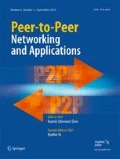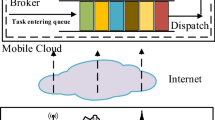Abstract
The explosive growth of mobile devices and the rapid development of wireless networks and mobile computing technologies have stimulated the emergence of many new computing paradigms, such as Fog Computing, Mobile Cloud Computing (MCC) etc. These newly emerged computation paradigms try to promote the mobile applications’ Quality of Service (QoS) through allowing the mobile devices to offload their computation tasks to the edge cloud and provide their idle computation capabilities for executing other devices’ offloaded tasks. Therefore, it is very critical to efficiently schedule the offloaded tasks especially when the available computation, storage, communication resources and energy supply are limited. In this paper, we investigate the MCC-assisted execution of multi-tasks scheduling problem in hybrid MCC architecture. Firstly, this problem is formulated as an optimization problem. Secondly, a Cooperative Multi-tasks Scheduling based on Ant Colony Optimization algorithm (CMSACO) is put forward to tackle this problem, which considers task profit, task deadline, task dependence, node heterogeneity and load balancing. Finally, a series of simulation experiments are conducted to evaluate the performance of the proposed scheduling algorithm. Experimental results have shown that our proposal is more efficient than a few typical existing algorithms.











Similar content being viewed by others
References
Index VN (2012) Cisco visual networking index: Forecast and methodology, 2012–2017, White Paper Cisco Systems Inc
Chiang M, Zhang T (2016) Fog and iot: an overview of research opportunities. IEEE Internet of Things Journal 3:
Bonomi F, Milito R, Zhu J, Addepalli S (2012) Fog computing and its role in the internet of things Edition of the Mcc workshop on Mobile Cloud Computing, pp 13–16
Shi W, Dustdar S (2016) The promise of edge computing. Computer 49(5):78–81
Luan TH, Gao L, Li Z, Xiang Y, Sun L (2016) Fog computing: Focusing on mobile users at the edge, Computer Science
Mahmud R, Buyya R (2016) Fog computing: A taxonomy, survey and future directions
Hou X, Li Y, Chen M, Wu D (2016) Vehicular fog computing: a viewpoint of vehicles as the infrastructures. IEEE Trans Veh Technol 65(6):1–1
Chun B-G, Maniatis P (2009) Augmented smartphone applications through clone cloud execution HotOS, vol 9, pp 8–11
Dinh HT, Lee C, Niyato D, Wang P (2013) A survey of mobile cloud computing: architecture, applications, and approaches. Wirel Commun Mob Comput 13(18):1587–1611
Huerta-Canepa G, Lee D (2010) A virtual cloud computing provider for mobile devices Proceedings of the 1st ACM Workshop on Mobile Cloud Computing & Services: Social Networks and Beyond. ACM, p 6
Zhang W, Wen Y, Wu J, Li H (2013) Toward a unified elastic computing platform for smartphones with cloud support. IEEE Netw 27(5):34–40
Wei X, Fan J, Lu Z, Ding K (2013) Application scheduling in mobile cloud computing with load balancing. J Appl Math 2013:
Wei X, Fan J, Wang T, Wang Q (2015) Efficient application scheduling in mobile cloud computing based on max–min ant system. Soft Comput, 1–15
Wei X, Fan J, Lu Z, Ding K, Li R, Zhang G (2013) Bio-inspired application scheduling algorithm for mobile cloud computing 2013 Fourth International Conference on Emerging Intelligent Data and Web Technologies (EIDWT). IEEE, pp 690– 695
Zhang W, Wen Y, Wu D (2013) Energy-efficient scheduling policy for collaborative execution in mobile cloud computing 2013 Proceedings IEEE INFOCOM. IEEE, pp 190–194
Zhang W, Wen Y (2015) Cloud-assisted collaborative execution for mobile applications with general task topology 2015 IEEE International Conference on Communications (ICC). IEEE, pp 6815–6821
Giurgiu I, Riva O, Juric D, Krivulev I, Alonso G (2009) Calling the cloud: enabling mobile phones as interfaces to cloud applications ACM/IFIP/USENIX International Conference on Distributed Systems Platforms and Open Distributed Processing. Springer, pp 83–102
Xie J, Dan L, Yin L, Sun Z, Xiao Y (2015) An energy-optimal scheduling for collaborative execution in mobile cloud computing 2015 International Conference and Workshop on Computing and Communication (IEMCON). IEEE, pp 1–6
Lin W, Lei J, Kliazovich D, Bouvry P (2016) Reconciling task assignment and scheduling in mobile edge clouds The Workshop on Hot Topics in Practical Networked Systems, pp 1–6
Zhu X, Yang LT, Chen H, Wang J, Yin S, Liu X (2014) Real-time tasks oriented energy-aware scheduling in virtualized clouds. IEEE Transactions on Cloud Computing 2(2):168–180
Wen Y, Zhang W, Luo H (2012) Energy-optimal mobile application execution: Taming resource-poor mobile devices with cloud clones 2012 Proceedings IEEE INFOCOM. IEEE, pp 2716–2720
Huang D, Wang P, Niyato D (2012) A dynamic offloading algorithm for mobile computing. IEEE Trans Wirel Commun 11(6):1991–1995
Rong P, Pedram M (2006) Power-aware scheduling and dynamic voltage setting for tasks running on a hard real-time system Asia and South Pacific Conference on Design Automation, 2006. IEEE, p 6
Wu H, Wang Q, Wolter K (2013) Tradeoff between performance improvement and energy saving in mobile cloud offloading systems 2013 IEEE International Conference on Communications Workshops (ICC). IEEE, pp 728–732
Lee YC, Zomaya AY (2009) Minimizing energy consumption for precedence-constrained applications using dynamic voltage scaling 9th IEEE/ACM International Symposium on Cluster Computing and the Grid, 2009. CCGRID’09. IEEE, pp 92–99
Lin X, Wang Y, Xie Q, Pedram M (2014) Energy and performance-aware task scheduling in a mobile cloud computing environment 2014 IEEE 7th International Conference on Cloud Computing. IEEE, pp 192–199
Zhou AC, He B (2014) Transformation-based monetary costoptimizations for workflows in the cloud. IEEE Transactions on Cloud Computing 2(1):85–98
Van den Bossche R, Vanmechelen K, Broeckhove J (2010) Cost-optimal scheduling in hybrid iaas clouds for deadline constrained workloads 2010 IEEE 3rd International Conference on Cloud Computing. IEEE, pp 228–235
Zeng D, Gu L, Guo S, Cheng Z, Yu S (2016) Joint optimization of task scheduling and image placement in fog computing supported software-defined embedded system. IEEE Trans Commun 65:1–1
Tayal S (2011) Tasks scheduling optimization for the cloud computing systems. IJAEST-international journal of advanced engineering sciences and technologies 1(5):111–115
Feller E, Rilling L, Morin C (2011) Energy-aware ant colony based workload placement in clouds Proceedings of the 2011 IEEE/ACM 12th International Conference on Grid Computing. IEEE Computer Society, pp 26–33
Xu B, Peng Z, Xiao F, Gates AM, Yu J-P (2015) Dynamic deployment of virtual machines in cloud computing using multi-objective optimization. Soft Comput 19(8):2265–2273
Zafer M, Modiano E (2007) Minimum energy transmission over a wireless fading channel with packet deadlines 2007 46th IEEE Conference on Decision and Control. IEEE, pp 1148–1155
Johnston LA, Krishnamurthy V (2006) Opportunistic file transfer over a fading channel: a pomdp search theory formulation with optimal threshold policies. IEEE Trans Wirel Commun 5(2):394–405
Leguizamon G, Michalewicz Z (1999) A new version of ant system for subset problems Proceedings of the 1999 Congress on Evolutionary Computation, 1999. CEC 99, vol 2. IEEE
Etminani K, Naghibzadeh M (2007) A Min-Min Max-Min selective algorithm for grid task scheduling
Elzeki O, Reshad M, Elsoud M (2012) Improved max-min algorithm in cloud computing. Int J Comput Appl 50(12):22–27
Acknowledgements
This research was supported in part by the National Natural Science Foundation of China under Grant No. 61402521, the Jiangsu Province Natural Science Foundation of China under Grant No. BK20140068 and No. BK20150201, the Major State Basic Research Development Program of China (973 Program) No. 2012CB315806.
Author information
Authors and Affiliations
Corresponding author
Additional information
This article is part of the Topical Collection: Special Issue on Fog Computing on Wheels
Guest Editors: Hongzi Zhu, Tom H. Luan, Mianxiong Dong, and Peng Cheng
Rights and permissions
About this article
Cite this article
Wang, T., Wei, X., Tang, C. et al. Efficient multi-tasks scheduling algorithm in mobile cloud computing with time constraints. Peer-to-Peer Netw. Appl. 11, 793–807 (2018). https://doi.org/10.1007/s12083-017-0561-9
Received:
Accepted:
Published:
Issue Date:
DOI: https://doi.org/10.1007/s12083-017-0561-9




